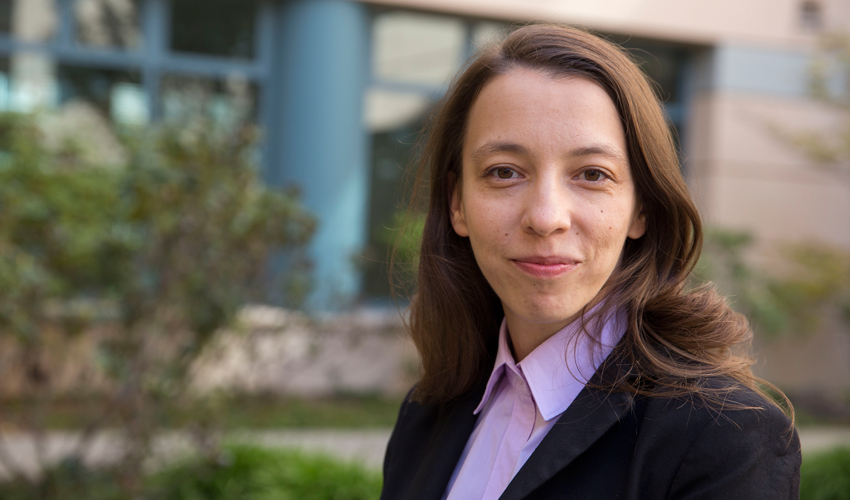Language, political identity strongly linked in Ukraine conflict

Assistant Professor of Linguistics Anastasia Smirnova recently had her research paper "Political and Linguistic Identities in an Ethnic Conflict" published in the Journal of Language and Social Psychology.
The language associated with a person's political preferences could play a significant role in forming social prejudices throughout a bilingual region, according to a new study from Anastasia Smirnova, an assistant professor of linguistics with SF State's Department of English Language and Literature.
The findings, recently published in the Journal of Language and Social Psychology, reveal strong correlations between language, political identity and the ethnic conflict in the Eastern European nation of Ukraine, Smirnova's native country, and offer guidance for those working to solve such conflicts.
Smirnova's study focuses on ethnolinguistics — the branch of linguistics concerned with the relations between linguistic and cultural behavior. To better understand these relations in the context of Ukraine, which has been a hotbed of cultural and political unrest since Russia's annexation of the Crimea region in 2014, Smirnova and co-author Rumen Iliev studied two different paths, or hypotheses, through which language could trigger social discrimination — linguistic identity and political identity. Through linguistic identity, people may favor others who simply speak the same language and have the same accent. Through political identity, people may favor others who use a language that is associated with their own personal political views and beliefs, even if the actual language of the speaker differs from their own.
Smirnova says that language itself has traditionally been perceived as a powerful "marker" for social discrimination and an avenue for humans to form prejudices and stereotypes against various social groups based on how they perceive speakers from those groups. Examples include the numerous documented cases of discrimination against minorities who speak with foreign accents and the use of villainous characters who often speak with foreign accents in films, shows and cartoons.
"As humans, we do form stereotypes based on language, and people are often discriminated against based on the language they speak," Smirnova said. "Surprisingly, we found that it's not only the language you speak, but it's also the association between the language and the political view that is important."
Data from Smirnova and Iliev's study showed patterns that were consistent with the political identity hypothesis only — providing preliminary evidence that political preferences might lead to stronger language-based social discrimination than one's own linguistic preferences.
"We found that our evaluators tend to perceive and evaluate the target speaker based on their political identity," Smirnova explained. "If you speak Russian, but politically you are pro-Ukrainian, you will like and trust Ukrainian speakers more, even though you speak Russian in everyday life."
When it came time to research a location with the appropriate cultural factors that would allow her to properly test her hypotheses, Smirnova didn't have to look much further than her native Ukraine. Within the country, both Ukrainian and Russian are predominantly spoken and political views are highly polarized, with regions speaking different languages tending to vote for opposite presidential candidates.
"I was moved by the recent events [in Ukraine] and like many people who live there, I wanted to understand the reasons of this conflict — this was important to me on a personal level," explained Smirnova, who lived in Ukraine until age 17. "I grew up in Ukraine and I speak both languages [Ukrainian and Russian], so it was important for me to understand possible motivations behind interpersonal relations in the situation of an ethnolinguistic conflict."
To test which identity hypothesis, linguistic or political, was more prevalent in Ukraine, Smirnova conducted two separate studies between February and May 2015, recruiting 258 participants who understood both Ukrainian and Russian.
The first study took three news stories on politically neutral topics and translated them into Ukrainian, Russian and Surzhyk (a mixture of Ukrainian and Russian) for participants to read. Using a Likert-type scale, participants indicated which language or languages they prefer to speak in everyday life, then answered additional questions about the annexation of Crimea and the subsequent activities of separatists and the Ukrainian and Russian armies. Lastly, participants answered questions about the perceived intelligence, trustworthiness and likability of each article's writer. The second study followed the same framework as the first, except this time participants listened to excerpts, rerecorded by three female linguists, from interviews and speeches from three Ukrainian politicians that were unrelated to the nation's current political turmoil.
According to Smirnova, the prevalence of the political identity hypothesis over linguistic identity, which can be much more embedded in society and difficult to change over time, offers a positive message for those working to end the widespread ethnic turmoil in Ukraine.
"Had we found that linguistic identities were solely responsible for social discrimination, we would have been less optimistic about the future of the conflict," Smirnova said. "Instead, we found that language-based discrimination was driven by political identities, and political processes are easier to interfere with than trying to change long-lasting historical divides. In a sense, our findings emphasize the responsibilities that political elites have in handling ethnolinguistic conflicts."